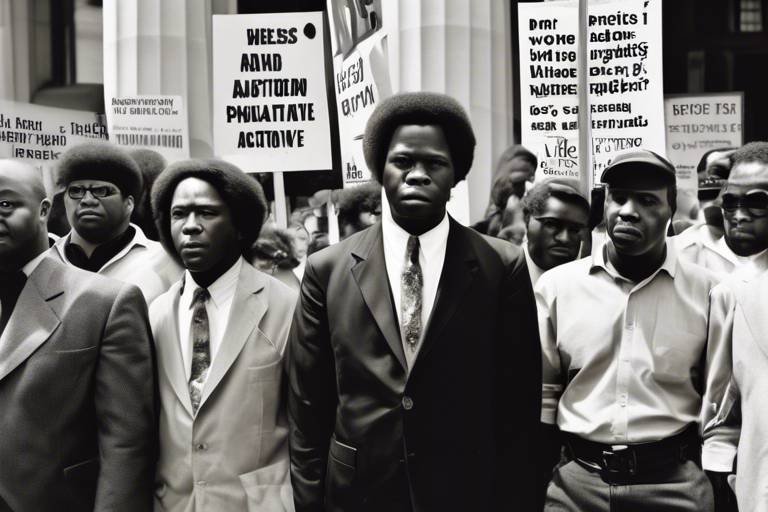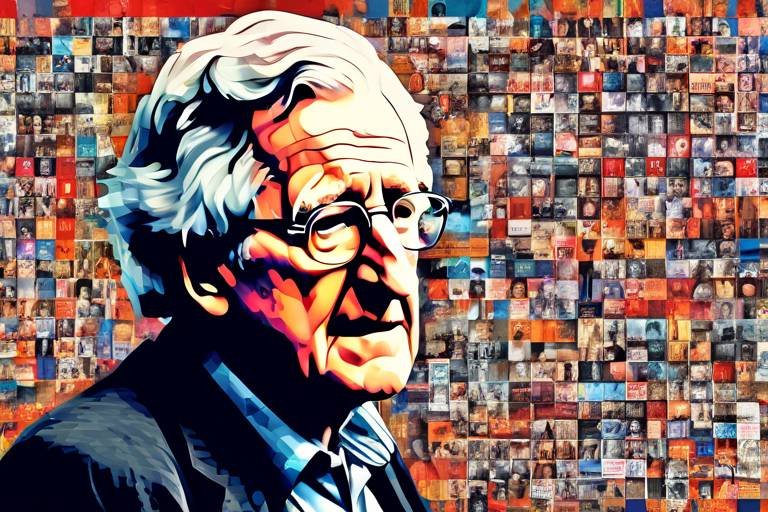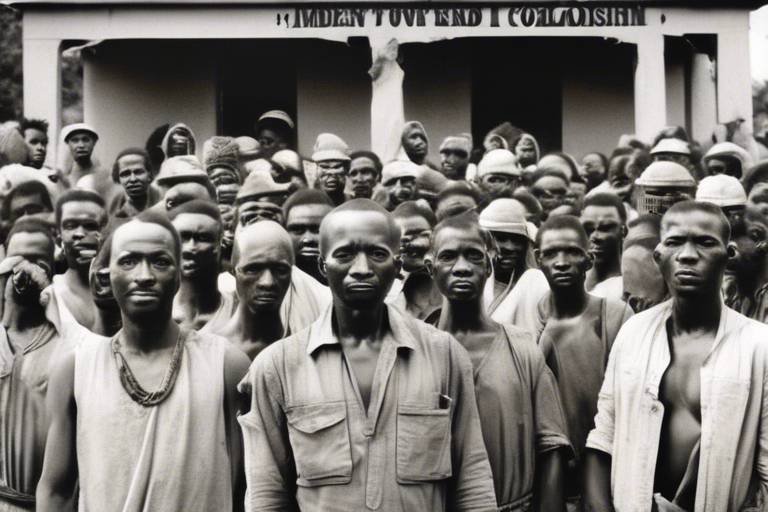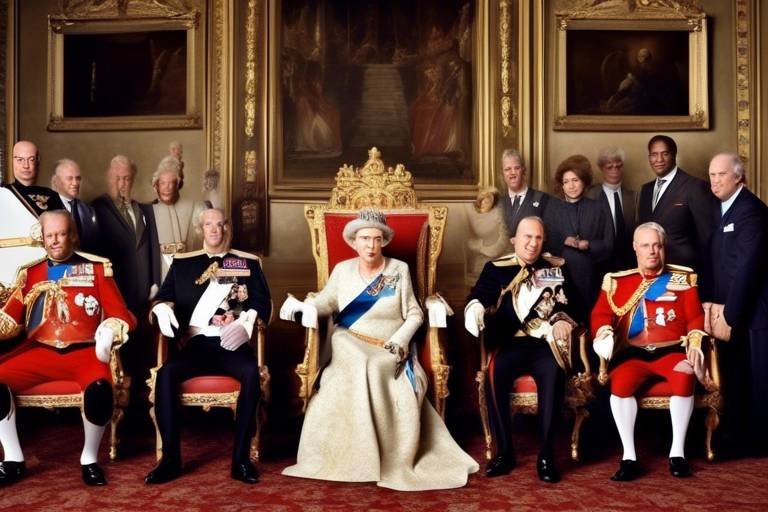The Philosophy of Colonialism: Its Long-lasting Political Impact
Colonialism has left an indelible mark on the political landscape of the world, shaping not only the borders we see on maps today but also the very identities of nations and their peoples. At its core, the philosophy of colonialism was driven by a belief in superiority, where colonizers viewed themselves as bearers of civilization, tasked with enlightening those they deemed "lesser." This article explores the philosophical underpinnings of colonialism and its enduring effects on political structures, identities, and relationships in former colonies, providing a comprehensive understanding of its historical significance.
To grasp the full impact of colonialism, it is essential to examine the philosophical theories that justified its expansion. Think of colonialism as a massive wave crashing onto the shores of different cultures, reshaping them in its wake. Ideologies of superiority, such as Social Darwinism and Eurocentrism, painted a picture where Western civilizations were seen as the pinnacle of human achievement. This perspective not only fueled colonial ambitions but also legitimized the exploitation of resources and people in colonized regions. Colonizers often believed they were on a divine mission to civilize the world, a notion that led to the imposition of foreign governance and cultural practices.
As colonial powers established their dominance, they inadvertently set the stage for the complex formation of national identities in colonized nations. The imposition of foreign rule often led to a cultural clash, creating a rich tapestry of influences that shaped local identities. For many, the struggle to establish a national identity became a journey of self-discovery, often leading to an identity crisis. The question arises: how do you reconcile a rich indigenous heritage with the imposed values of a colonizer? This struggle often manifests in a duality of identity, where individuals grapple with their roots while navigating the expectations of a modern world.
The cultural consequences of colonialism were profound and often devastating. Indigenous cultures faced erosion as colonial powers sought to impose their values and practices. This led to a transformation of traditional ways of life, where age-old customs were either suppressed or altered. The struggle for cultural preservation became a rallying cry for many communities, as they sought to reclaim their heritage in the face of overwhelming odds. The impact was not just on the surface; it penetrated deep into the social fabric of these societies, leading to a loss of languages, traditions, and even spiritual beliefs.
Language played a pivotal role in the colonial experience. The imposition of colonial languages often marginalized indigenous tongues, leading to a disconnect between generations. Imagine a world where your mother tongue is deemed inferior, forcing you to communicate in a language that feels foreign to your very being. This linguistic shift not only affected communication but also cultural expression, as the nuances and richness of indigenous languages were lost. The struggle to preserve these languages continues today, as communities work tirelessly to revitalize their linguistic heritage.
Colonialism also brought about significant religious transformations. The introduction of new faiths often came hand-in-hand with the suppression of indigenous spiritual practices. This clash of beliefs led to a complex interplay of acceptance and resistance, where communities navigated their spiritual identities amidst external pressures. The legacy of these transformations is still felt today, as many societies grapple with the remnants of colonial religious influence while seeking to reconnect with their traditional practices.
The political ramifications of colonialism are evident in the governance structures of former colonies. Many nations emerged from colonial rule with political systems that were often ill-suited to their cultural contexts. The legacies of colonialism can be seen in the ongoing struggles for democracy, representation, and social justice within these nations. Understanding these dynamics is crucial, as they reveal the complexities of power and governance shaped by a colonial past.
Colonial rule was met with various forms of resistance, reflecting the resilience of colonized peoples. These movements were not just reactions to oppression; they were expressions of identity, culture, and a desire for self-determination. From grassroots movements to intellectual resistance, the fight against colonialism was multifaceted, illustrating the diverse strategies employed to challenge authority and assert rights.
Grassroots movements played a crucial role in challenging colonial authority. Local populations organized protests, strikes, and uprisings to assert their rights and demand change. These movements were often fueled by a sense of community and shared purpose, as individuals came together to resist oppression. The spirit of unity in these struggles serves as a powerful reminder of the strength found in collective action.
Intellectuals and writers also contributed significantly to the anti-colonial discourse. Through literature, essays, and speeches, they articulated the sentiments of their people, challenging the narratives imposed by colonial powers. Their words became a source of inspiration, igniting a fire of resistance that resonated with many. This intellectual resistance shaped political thought and action, laying the groundwork for future movements.
As we reflect on the ongoing impact of colonialism, it is clear that historical injustices continue to affect political relationships and social dynamics in the modern world. The echoes of colonialism can be heard in contemporary debates about reparations, cultural appropriation, and social justice. Understanding this legacy is essential for fostering meaningful dialogue and addressing the inequalities that persist today.
- What is colonialism? Colonialism is the practice of acquiring control over another country or territory, often involving the displacement of indigenous populations and the imposition of foreign governance and culture.
- How did colonialism affect national identities? Colonialism complicated national identities by imposing foreign values and practices, leading to identity crises and a struggle to reconcile indigenous heritage with colonial influences.
- What are some examples of resistance movements? Resistance movements varied from grassroots protests to intellectual movements, where local populations and thinkers organized to challenge colonial authority and assert their rights.
- How does colonialism impact modern politics? The legacies of colonialism continue to shape contemporary governance, social dynamics, and political relationships, often manifesting in ongoing struggles for justice and equality.

Theoretical Foundations of Colonialism
Colonialism, at its core, is often justified through a variety of philosophical theories that have historically painted a picture of superiority and civilization. These ideologies not only rationalized the expansion of empires but also laid the groundwork for the exploitation of colonized peoples. One of the most prevalent theories was the notion of the “White Man’s Burden,” which suggested that it was the duty of Western nations to civilize the so-called 'backward' societies. This paternalistic view created a moral justification for colonial domination, framing it as a benevolent act rather than an oppressive one.
Furthermore, the philosophy of social Darwinism played a significant role in shaping colonial attitudes. The idea that certain races were inherently superior to others led to the belief that it was natural for stronger nations to dominate weaker ones. This pseudo-scientific rationale was not just a justification for colonialism; it became a self-fulfilling prophecy that perpetuated inequality and discrimination. As a result, colonial powers often viewed their actions as a means of spreading progress and enlightenment, despite the devastating consequences for indigenous populations.
To better understand these theoretical foundations, we can categorize them into several key ideologies:
- Racial Superiority: The belief that certain races are superior to others, providing a justification for domination.
- Civilizing Mission: The idea that colonial powers had a duty to 'civilize' indigenous peoples, often leading to cultural erasure.
- Economic Exploitation: The view that colonies existed primarily for the economic benefit of the colonizers, with little regard for the local population.
The implications of these ideologies were profound and far-reaching. The policies enacted under colonial rule were often steeped in these beliefs, leading to systemic inequalities that persisted long after the colonizers left. For example, land dispossession was justified under the guise of 'improving' the land, while the introduction of Western education systems aimed to reshape indigenous identities to fit colonial narratives.
Moreover, the philosophical underpinnings of colonialism have left an indelible mark on the political landscape of former colonies. The governance structures established during colonial rule often mirrored those of the colonizers, leading to a legacy of authoritarianism and inequality that many nations are still grappling with today. Understanding these theoretical foundations is crucial for unpacking the complex relationships and identities that have emerged in the wake of colonialism.
In summary, the theoretical foundations of colonialism are rooted in ideologies that not only justified the subjugation of entire populations but also shaped the political and cultural landscapes of the modern world. By critically examining these philosophies, we can better comprehend the lasting impacts of colonialism and the ongoing struggles for identity and justice in formerly colonized nations.

Colonialism and National Identity
Colonialism has left an indelible mark on the national identities of many countries around the globe. When colonial powers imposed their rule, they didn't just bring new governance; they also introduced a plethora of cultural, social, and economic changes that often clashed with existing local traditions. This clash led to a complex interplay between the colonizers' identities and those of the colonized, resulting in a multifaceted legacy that still influences national identities today. The question arises: how do nations reconcile their indigenous roots with the imposed identities of their colonial past?
The formation of national identity in colonized nations is often characterized by a struggle for self-definition. Many countries emerged from colonial rule with a deep-seated desire to reclaim their cultural heritage while simultaneously navigating the remnants of colonial influence. This duality can lead to what some scholars refer to as an "identity crisis," where individuals and communities grapple with conflicting narratives about who they are. For instance, in countries like India and Nigeria, the blend of indigenous customs with colonial legacies creates a rich tapestry of identity that is both vibrant and contentious.
Moreover, the impact of colonialism on national identity is not merely historical; it continues to evolve. In many post-colonial societies, there is a conscious effort to revive indigenous languages, customs, and traditions that were suppressed or marginalized during colonial times. This revival is not just about cultural preservation; it's a powerful statement of resistance against the lingering effects of colonialism. For example, in countries like South Africa, the post-apartheid era has seen a resurgence of interest in indigenous languages and cultural practices as a means to foster unity and national pride.
To understand the complexities of national identity in the context of colonialism, it's essential to consider the various factors at play:
- Historical Context: The specific historical circumstances of each colonized nation greatly influence its national identity today. The duration of colonial rule, the nature of the colonizers, and the methods of resistance all play a role.
- Cultural Hybridity: Many nations exhibit a blend of indigenous and colonial cultures, leading to unique identities that reflect this hybridity.
- Political Narratives: The way national histories are taught and remembered can shape collective identities and influence how future generations view their past.
Ultimately, the legacy of colonialism is a double-edged sword. While it has often led to the erasure of indigenous cultures, it has also sparked movements aimed at reclaiming and redefining national identities. As nations continue to grapple with their colonial pasts, the journey towards a cohesive national identity remains ongoing, filled with both challenges and opportunities for growth.
- How does colonialism affect national identity?
Colonialism can lead to a complex national identity that includes both indigenous and colonial influences, often resulting in identity crises as nations try to reconcile these elements.
- What role do indigenous cultures play in post-colonial identity?
Indigenous cultures are vital in shaping post-colonial identities, as many nations seek to revive and celebrate their cultural heritage after years of suppression.
- Can a nation fully escape its colonial past?
While a nation may strive to overcome its colonial past, the influences and legacies often linger, shaping political, social, and cultural dynamics for generations to come.

Impact on Indigenous Cultures
Colonialism has had a profound and often devastating impact on indigenous cultures around the world. When colonial powers set out to conquer and claim territories, they did not merely impose their political structures; they also sought to reshape the very fabric of the societies they encountered. This transformation often led to the erosion of traditional practices, languages, and belief systems, leaving a complex legacy that continues to affect indigenous communities today. The consequences of these actions can be likened to a stone thrown into a still pond, sending ripples that extend far beyond the point of impact.
The first and perhaps most visible effect of colonialism on indigenous cultures was the loss of land. As colonial powers expanded their territories, they displaced countless indigenous peoples, forcing them into smaller and often less fertile areas. This loss of land not only disrupted traditional ways of life but also severed the deep spiritual connections many indigenous communities held with their ancestral territories. The land was not just a resource; it was a core component of their identity and cultural heritage.
Moreover, the imposition of foreign governance structures often disregarded existing social hierarchies and governance systems, leading to a breakdown of traditional leadership and community cohesion. Indigenous peoples were frequently subjected to new laws and regulations that did not reflect their values or ways of life. This disruption can be seen as a cultural earthquake, where the aftershocks are felt long after the initial tremor has subsided.
Language, a fundamental aspect of any culture, was also significantly affected. Colonial powers often imposed their languages as the medium of education, administration, and commerce. As a result, many indigenous languages faced extinction, leading to a loss of unique worldviews and cultural expressions. For instance, consider the following table that illustrates the alarming decline of indigenous languages:
| Region | Indigenous Languages Before Colonialism | Indigenous Languages Today | Percentage Decline |
|---|---|---|---|
| North America | 300+ | 175 | 42% |
| Australia | 250+ | 60 | 76% |
| Africa | 2000+ | 800 | 60% |
This table highlights the staggering decline in the number of indigenous languages, which serves as a reminder of the cultural loss experienced due to colonialism. The suppression of indigenous languages not only stripped communities of their means of communication but also hindered the transmission of traditional knowledge and cultural practices to future generations.
Religious transformations were yet another facet of the cultural impact of colonialism. Many colonial powers sought to convert indigenous populations to Christianity, often through force or coercion. This led to the suppression of indigenous spiritual practices, which were frequently deemed "pagan" or "savage." The result was a cultural dissonance where traditional beliefs were either abandoned or transformed to fit within the framework of the imposed religion. The spiritual landscape of many indigenous communities was irrevocably altered, creating a blend of old and new that often left individuals grappling with their identities.
In conclusion, the impact of colonialism on indigenous cultures is a multifaceted issue that encompasses land dispossession, language loss, and religious transformation. These changes have created lasting scars that continue to affect indigenous communities in their quest for cultural preservation and identity reclamation. Understanding this impact is crucial for fostering a sense of empathy and support for indigenous peoples as they navigate the complexities of their heritage in a post-colonial world.
- What are the main effects of colonialism on indigenous cultures?
Colonialism has led to land dispossession, language loss, and the suppression of traditional beliefs, significantly altering indigenous identities and cultural practices. - How can we support indigenous cultures today?
Support can come in many forms, including advocating for language preservation, recognizing indigenous land rights, and promoting cultural education and awareness. - Are there any movements aimed at preserving indigenous cultures?
Yes, numerous grassroots movements and organizations work tirelessly to preserve indigenous languages, customs, and rights across the globe.

Language and Communication
The role of language in colonial contexts is not just a matter of communication; it is deeply intertwined with power dynamics, cultural identity, and social structures. When colonial powers imposed their languages on colonized nations, they didn't merely introduce a new means of communication. Instead, they initiated a profound shift that affected how people understood themselves and their place in the world. Imagine walking into a room where everyone speaks a language you don’t understand; it’s isolating, isn’t it? This is what many indigenous populations experienced as their native tongues were marginalized or outright suppressed.
Colonizers often viewed their languages as symbols of civilization and superiority. They believed that by replacing indigenous languages with their own, they were not just facilitating communication but also elevating the colonized people to a 'higher' cultural status. This belief led to the systematic erosion of native languages, which are not merely tools for communication but also vessels of history, tradition, and identity. When a language dies, it’s like a library burning down—entire worlds of knowledge and culture are lost forever.
In many cases, colonial authorities implemented educational systems designed to teach the colonized populations the colonizer's language, often at the expense of their native tongues. This created a significant divide within communities, leading to a generation that was fluent in the language of the oppressor but disconnected from its own cultural roots. For instance, in countries like India and Nigeria, English and French became languages of power and prestige, while local dialects were often relegated to the background, viewed as inferior or less sophisticated.
Moreover, the imposition of colonial languages has lasting implications for communication styles and cultural expression. In a post-colonial context, many individuals find themselves navigating a complex linguistic landscape where they must switch between languages depending on the social setting. This phenomenon, known as code-switching, can be both empowering and alienating. On one hand, it allows for greater flexibility and adaptability in a globalized world; on the other hand, it can create feelings of inauthenticity and cultural dislocation.
To illustrate this point, consider the following table that highlights the linguistic diversity in a post-colonial nation like India:
| Language | Number of Speakers | Colonial Influence |
|---|---|---|
| Hindi | 600 million | Minimal |
| English | 125 million | Significant |
| Bengali | 230 million | Minimal |
| Urdu | 70 million | Moderate |
This table highlights the coexistence of different languages and the varying degrees of colonial influence on them. The presence of English as a significant language in India illustrates the colonial legacy that continues to shape communication, education, and social interactions. As a result, many Indians find themselves bilingual or multilingual, navigating the complexities of their identities through the languages they speak.
In conclusion, the impact of colonialism on language and communication extends far beyond mere vocabulary. It shapes how communities express themselves, connect with their heritage, and engage with the world. The struggle for linguistic preservation and the revitalization of indigenous languages has become a vital aspect of cultural identity in many post-colonial societies. As we continue to explore the ramifications of colonialism, it’s essential to recognize that language is not just a means of communication; it is a powerful tool that can either bind communities together or drive them apart.
- What is the impact of colonial languages on indigenous cultures? Colonial languages often overshadow indigenous languages, leading to cultural erosion and identity crises.
- How does language influence identity? Language is a fundamental aspect of cultural identity, shaping how individuals perceive themselves and their heritage.
- What is code-switching? Code-switching is the practice of alternating between languages or dialects in conversation, often reflecting social contexts and cultural identities.
- Can indigenous languages be revived? Yes, many communities are actively working to revitalize and preserve their native languages through education and cultural initiatives.

Religious Transformations
The impact of colonialism on religious practices in colonized regions is profound and multifaceted. When colonial powers invaded foreign lands, they didn’t just impose their political and economic systems; they also sought to reshape the spiritual landscape. This transformation often involved the introduction of new religions, primarily Christianity, while simultaneously suppressing and undermining indigenous spiritual practices. The result was a complex interplay of faiths that continues to influence societies today.
At the heart of this transformation was the belief held by colonizers that their religion was superior. This ideology was often couched in the language of civilizing missions, where the spread of Christianity was seen as a moral obligation. Missionaries played a crucial role in this endeavor, establishing schools and churches, which became centers of both education and conversion. However, this was not merely a benign act of sharing faith; it often involved the denigration of local beliefs and practices. Indigenous religions, rich in tradition and history, were frequently labeled as primitive or pagan, leading to a cultural erasure that many communities still grapple with today.
Moreover, the imposition of new religious practices led to significant social changes. For instance, many indigenous people were forced to abandon their traditional rituals, which had been integral to their identity and community cohesion. In some cases, this led to a loss of cultural heritage and a disconnection from ancestral roots. The colonial narrative often painted these transformations as progress, but for many, it was a painful severing of ties to their past.
In contemporary society, the legacy of these religious transformations is evident. Many former colonies are marked by a unique blend of indigenous and colonial religions, resulting in syncretic practices that reflect this tumultuous history. For example, in countries like Brazil and Haiti, traditional African religions have fused with Christianity to create vibrant, hybrid spiritual practices that resist the dichotomy imposed by colonial powers. This blending is a testament to the resilience of indigenous cultures, showcasing their ability to adapt and survive despite centuries of oppression.
However, the struggle for religious identity continues. In many regions, there is an ongoing quest to reclaim and revitalize indigenous spiritual practices that were suppressed during colonial rule. This revival is not just about restoring ancient traditions; it also serves as a means of asserting identity and autonomy in a post-colonial world. The challenge lies in navigating the complexities of a religious landscape that has been irrevocably altered.
In conclusion, the religious transformations brought about by colonialism are a significant aspect of its legacy. They highlight the broader cultural shifts that occurred and continue to resonate in contemporary societies. Understanding these transformations is crucial for grasping the full impact of colonialism on national identities and cultural expressions today.
- What were the primary religions introduced during colonialism?
Christianity was the predominant religion introduced by colonial powers, particularly through the efforts of missionaries. Other religions, such as Islam, also expanded in some regions due to trade and conquest.
- How did colonialism affect indigenous religions?
Colonialism often led to the suppression of indigenous religions, with many practices being deemed primitive. This resulted in a loss of cultural heritage and a struggle for identity among indigenous populations.
- Are there examples of syncretism in post-colonial societies?
Yes, syncretism is prevalent in many post-colonial societies. For instance, in Brazil, Afro-Brazilian religions like Candomblé blend African spiritual practices with elements of Christianity.
- What is the current status of indigenous religions?
Many communities are actively working to revive and preserve their indigenous spiritual practices, seeking to reclaim their cultural identities in the face of historical oppression.

Post-colonial Political Structures
When we examine the political landscape of former colonies, it's like peering into a kaleidoscope of history, culture, and power dynamics that have been shaped by the colonial experience. The legacies of colonialism are not just relics of the past; they are vibrant threads woven into the fabric of contemporary governance. In many cases, the political structures established during colonial rule have persisted, creating a complex relationship between the old and the new. This can often lead to a challenging scenario where nations struggle to forge their own identities while grappling with the shadows of their colonial past.
One of the most significant impacts of colonialism on post-colonial political structures is the establishment of centralized governance systems that were often imposed by colonial powers. These systems were designed to facilitate control and extract resources rather than to empower local populations. As a result, many newly independent nations found themselves with political frameworks that were ill-suited to their unique cultural and social contexts. This disconnect has led to a variety of challenges, including political instability, corruption, and a lack of representation for the diverse voices within these societies.
Furthermore, many post-colonial states have inherited legal systems that reflect colonial ideologies rather than the values and traditions of the indigenous peoples. For instance, laws that were created to maintain colonial order often disregard local customs and practices, leading to a sense of alienation among the populace. This legal dissonance can manifest in various ways, including social unrest and a lack of trust in governmental institutions. In essence, the very structures that were meant to bring order often perpetuate chaos.
Moreover, the political elite in many post-colonial nations often mirror the colonial hierarchy, where power is concentrated in the hands of a few. This has resulted in a political elite that may be more interested in maintaining their status than in addressing the needs of their constituents. The legacy of colonialism has, in many cases, created a political environment where loyalty to the ruling class supersedes national unity, leading to fragmentation and conflict.
To illustrate this point, let’s take a look at a few key characteristics of post-colonial political structures:
| Characteristic | Description |
|---|---|
| Centralization | Governance systems often retain centralized control established during colonial rule. |
| Legal Framework | Legal systems reflect colonial ideologies, often neglecting local customs. |
| Political Elite | Power is often concentrated in a small elite, leading to a disconnect with the populace. |
| Fragmentation | Political divisions can arise due to loyalty to the ruling class rather than national identity. |
In light of these challenges, many post-colonial nations are actively seeking to redefine their political structures. This process often involves a reassessment of historical narratives and a conscious effort to incorporate indigenous practices into governance. By doing so, these nations aim to create political environments that are more inclusive and representative of their diverse populations. The journey toward establishing a truly post-colonial identity is fraught with obstacles, but it is also filled with the potential for innovation and growth.
As we reflect on the enduring impact of colonialism on political structures, it becomes clear that the path forward requires a delicate balance between honoring historical legacies and forging new identities. The political evolution of post-colonial societies is an ongoing narrative, one that continues to unfold as they navigate the complexities of their past while striving for a more equitable future.
- What are the main challenges faced by post-colonial nations?
Post-colonial nations often face challenges such as political instability, corruption, and the struggle to create governance systems that reflect the needs of their diverse populations.
- How does colonialism affect national identity?
Colonialism can create complex cultural legacies that lead to identity crises, as nations grapple with the influences of their colonial past while trying to forge a unique national identity.
- What role do grassroots movements play in post-colonial societies?
Grassroots movements are crucial for challenging colonial legacies and advocating for the rights of local populations, often serving as catalysts for change and reform.

Resistance Movements
Resistance movements emerged as a powerful response to the oppressive structures of colonial rule, showcasing the resilience and determination of colonized peoples. These movements were not merely reactions to foreign domination; they were profound expressions of identity, culture, and the unyielding human spirit. Imagine a vast ocean, with waves of oppression crashing against the shore of freedom. Each wave represents a different form of resistance, from violent uprisings to peaceful protests, all striving to reclaim autonomy and dignity.
Throughout history, various forms of resistance have taken shape, each reflecting the unique circumstances and cultures of the colonized nations. Some movements were grassroots efforts, where local populations banded together to challenge colonial authority. These grassroots movements were often fueled by the shared experiences of injustice and exploitation. For instance, in India, the Quit India Movement of 1942 galvanized millions to demand an end to British rule, showcasing the power of collective action.
On the other hand, intellectual resistance played a crucial role in articulating anti-colonial sentiments. Writers, poets, and philosophers became the voice of the oppressed, crafting narratives that challenged colonial ideologies and inspired hope. Figures like Frantz Fanon and Aimé Césaire used their pens as weapons, dissecting the psychological effects of colonialism and advocating for liberation. Their works not only provided a critique of colonialism but also ignited a sense of pride and identity among the colonized.
Resistance movements often took various forms, including:
- Armed Struggles: Many nations resorted to armed conflict to resist colonial powers, leading to significant political changes.
- Peaceful Protests: Non-violent movements, such as boycotts and civil disobedience, were instrumental in challenging colonial authority.
- Cultural Revivals: Efforts to reclaim indigenous cultures and languages became a form of resistance against the cultural imperialism imposed by colonizers.
The impact of these resistance movements was profound, not only in terms of immediate political outcomes but also in shaping the national consciousness of post-colonial societies. They instilled a sense of pride and identity, allowing people to reclaim their narrative and assert their rights. The legacy of these struggles continues to inspire contemporary movements for social justice and equality worldwide.
In summary, resistance movements were vital in challenging colonial rule, manifesting in various forms that reflected the diverse experiences of colonized peoples. They were not just about opposing an external force; they were about reclaiming identity, culture, and agency. As we reflect on these movements, we recognize that the fight for justice and equality is an ongoing journey, deeply rooted in the history of colonialism.
What were the main forms of resistance against colonialism?
Resistance against colonialism manifested in various ways, including armed struggles, peaceful protests, and cultural revivals. Each form played a crucial role in challenging the authority of colonial powers.
How did intellectuals contribute to resistance movements?
Intellectuals used their writings to articulate anti-colonial sentiments, critique colonial ideologies, and inspire movements for liberation. Their ideas helped shape the political discourse of their time.
What is the legacy of resistance movements today?
The legacy of resistance movements continues to influence contemporary struggles for social justice, equality, and human rights, reminding us of the importance of collective action in the face of oppression.

Grassroots Movements
Grassroots movements have played a pivotal role in challenging colonial authority and asserting the rights of local populations. These movements often arise organically from the community, driven by a shared sense of injustice and the desire for self-determination. Imagine a small seed sprouting in a vast field; it symbolizes how ordinary individuals can unite to push back against powerful colonial forces. These movements are not just about resistance; they are about reclaiming identity, culture, and autonomy.
One of the most striking features of grassroots movements is their ability to mobilize people from all walks of life. They often begin with local leaders or community activists who recognize the need for change, gathering support from neighbors, friends, and family. The energy and passion that fuel these movements can be contagious, creating a wave of activism that spreads like wildfire. For instance, in many colonized regions, local farmers, laborers, and women have come together to challenge oppressive policies that threaten their livelihoods and cultural practices.
These movements can take many forms, ranging from peaceful protests and community organizing to more radical actions. They often leverage traditional cultural practices and symbols to foster unity and resilience. For example, in some African nations, traditional songs and dances have been used as tools of protest, reminding people of their heritage while simultaneously calling for change. This blend of cultural expression and political activism not only strengthens the movement but also reinforces a collective identity among participants.
Moreover, grassroots movements have been instrumental in raising awareness about colonial injustices on a global scale. Through social media and other communication platforms, these movements can share their stories and struggles, garnering international support and solidarity. The power of storytelling cannot be underestimated; it humanizes the struggle and connects people across borders. As a result, grassroots movements have often inspired similar efforts in other colonized nations, creating a ripple effect of resistance.
However, the journey of grassroots movements is fraught with challenges. Many face brutal repression from colonial powers, which can lead to violence and intimidation. Despite this, the resilience of these movements is remarkable. They adapt, evolve, and find new ways to mobilize support, often turning to creative strategies to outsmart their oppressors. For instance, in some cases, they have utilized art, theater, and literature to communicate their messages and inspire action, proving that creativity can be a powerful weapon against oppression.
In conclusion, grassroots movements are essential to understanding the broader narrative of resistance against colonialism. They represent the voices of the marginalized and the oppressed, standing firm against the tide of colonial domination. By fostering a sense of community and shared purpose, these movements not only challenge the status quo but also lay the groundwork for a more equitable future. As we reflect on the impact of colonialism today, it is crucial to recognize and support these grassroots efforts, acknowledging their role in shaping political thought and action in post-colonial societies.
- What are grassroots movements? Grassroots movements are community-driven initiatives that arise from the collective efforts of ordinary individuals seeking social or political change.
- How do grassroots movements challenge colonialism? They challenge colonialism by mobilizing local communities to resist oppressive policies, reclaim cultural identities, and assert their rights.
- What role does culture play in grassroots movements? Culture plays a significant role by providing symbols and practices that foster unity, resilience, and a sense of identity among participants.
- Can grassroots movements gain international support? Yes, they can gain international support through storytelling, social media, and solidarity from other movements worldwide.
- What challenges do grassroots movements face? They often face repression, violence, and intimidation from colonial powers, but they adapt and find creative ways to continue their struggle.

Intellectual Resistance
Intellectual resistance during colonial rule was not just an act of defiance; it was a profound assertion of identity and autonomy. Think about it: when a dominant power seeks to erase your culture and impose its own, what better way to fight back than through the power of words? Writers, poets, and thinkers became the torchbearers of anti-colonial sentiment, using their pens as weapons to challenge the narratives imposed by colonial authorities. These intellectuals understood that the battle for freedom was as much about reclaiming their stories and histories as it was about physical liberation.
One of the most notable figures in this intellectual resistance was the Indian philosopher and poet Rabindranath Tagore. He not only criticized British colonial policies but also emphasized the importance of cultural pride and self-determination. His works resonated deeply with the masses, inspiring a generation to question the status quo. Tagore's belief that “the highest education is that which does not merely give us information but makes our life in harmony with all existence” encapsulates the essence of intellectual resistance. It was about fostering a sense of identity that transcended colonial boundaries.
Moreover, the impact of intellectual resistance can be seen across various regions. In Africa, for instance, the writings of Chinua Achebe and Ngũgĩ wa Thiong'o challenged the colonial narratives that depicted African cultures as primitive and inferior. These authors not only highlighted the richness of their indigenous cultures but also critiqued the lingering effects of colonialism on contemporary society. They argued that language plays a crucial role in shaping identity and that reclaiming indigenous languages was essential for true liberation.
To illustrate the breadth of intellectual resistance, consider the following table that highlights key figures and their contributions:
| Author | Region | Key Work | Contribution |
|---|---|---|---|
| Rabindranath Tagore | India | Gitanjali | Promoted cultural pride and self-determination |
| Chinua Achebe | Africa | Things Fall Apart | Challenged colonial portrayals of African culture |
| Ngũgĩ wa Thiong'o | Africa | Decolonising the Mind | Advocated for the use of indigenous languages |
| Frantz Fanon | Caribbean/Africa | The Wretched of the Earth | Analyzed the psychological effects of colonialism |
These intellectuals not only provided a voice to the oppressed but also laid the groundwork for future generations to continue the fight for justice and equality. They recognized that the struggle against colonialism was not merely a political one; it was deeply intertwined with cultural and intellectual sovereignty. By articulating their experiences and aspirations, they empowered others to join the resistance.
In essence, intellectual resistance was about reclaiming narratives and fostering a sense of belonging. It was a reminder that even in the darkest times, the light of knowledge and creativity could shine through, guiding societies toward liberation. The echoes of their thoughts and writings continue to resonate today, as we grapple with the complexities of identity and power in a post-colonial world.
- What is intellectual resistance? Intellectual resistance refers to the use of literature, philosophy, and art to challenge and oppose colonial narratives and practices.
- Who are some notable figures in intellectual resistance? Key figures include Rabindranath Tagore, Chinua Achebe, Ngũgĩ wa Thiong'o, and Frantz Fanon, among others.
- How did intellectual resistance influence post-colonial societies? It helped shape national identities, foster cultural pride, and inspired movements for social justice and equality.

The Legacy of Colonialism Today
Colonialism may seem like a chapter closed in the history books, but its legacy continues to ripple through the fabric of modern society. The effects of colonial rule are not just remnants of the past; they are living realities that shape the political, economic, and social landscapes of formerly colonized nations. It's almost as if colonialism cast a long shadow that still influences the way nations interact with each other and how they view themselves. Have you ever wondered how much of today’s political strife can be traced back to colonial decisions made centuries ago?
One of the most significant legacies of colonialism is the disruption of traditional governance. Many former colonies inherited political systems that were not only foreign but often ill-suited to their unique cultural contexts. For instance, the imposition of Western-style governance structures led to a disconnect between the rulers and the ruled, creating a political environment filled with tension and unrest. This disconnect can be seen in various regions, where power struggles and corruption are rampant, often rooted in the colonial practices of divide and rule. The political maps drawn during colonial times still dictate national boundaries, leading to conflicts that echo the past.
Additionally, the economic structures established during colonialism have left a lasting imprint. The extraction of resources for the benefit of the colonizers created economies that were heavily reliant on a few commodities. Even today, many former colonies find themselves in a cycle of dependency, struggling to diversify their economies and break free from the chains of their colonial past. The table below illustrates how some countries continue to rely on the same primary goods that were exploited during colonial times:
| Country | Main Export Commodity | Year of Independence |
|---|---|---|
| Nigeria | Crude Oil | 1960 |
| Democratic Republic of Congo | Copper | 1960 |
| Ghana | Cocoa | 1957 |
Furthermore, the social dynamics in post-colonial societies are often marked by identity crises. The colonial experience forced many nations to grapple with their identities, as they were subjected to foreign cultures and ideologies. This has led to a complex interplay between traditional values and modern influences, resulting in a rich yet tumultuous cultural landscape. People often find themselves caught between the remnants of colonial influence and the desire to reclaim their indigenous identities. It’s a bit like trying to find your way in a labyrinth where each turn represents a different aspect of your heritage.
In today’s globalized world, the political relationships between former colonies and their colonizers remain fraught with tension. Issues such as reparations, acknowledgment of past injustices, and the ongoing exploitation of resources are hot topics. Many nations demand that their former colonial powers take responsibility for the legacies of oppression and exploitation. This conversation is not just about the past; it’s about creating a more equitable future. The question looms: how can nations move forward while still addressing the wounds of history?
As we reflect on the ongoing impact of colonialism, it becomes clear that understanding this legacy is crucial for fostering meaningful dialogue and facilitating healing. Education plays a vital role in this process, as it allows individuals to comprehend the historical context of their societies. By learning about the past, people can better navigate the present and pave the way for a more just future. The journey towards reconciliation is complex, but by acknowledging the past, societies can begin to dismantle the structures that perpetuate inequality.
- What are some examples of colonial legacies in modern politics? - Many countries still face political instability and corruption rooted in colonial governance structures.
- How does colonialism affect national identity today? - Colonialism has led to complex identity issues where individuals often struggle to reconcile their indigenous heritage with colonial influences.
- What role does education play in addressing colonial legacies? - Education is essential for understanding historical contexts and fostering dialogue about past injustices.
Frequently Asked Questions
-
What were the main philosophical justifications for colonialism?
The philosophical justifications for colonialism often revolved around the ideas of superiority and civilization. Colonial powers believed that they had a moral obligation to 'civilize' the so-called 'backward' nations, which led to the imposition of their cultures, languages, and governance systems. This mindset was deeply rooted in ethnocentrism and the belief that Western civilization was the pinnacle of human development.
-
How did colonialism affect national identity in colonized countries?
Colonialism had a profound impact on national identity, often leading to a complex blend of cultural legacies and identity crises. As colonized nations struggled to forge their own identities, they faced the challenge of reconciling their indigenous cultures with the imposed values and beliefs of their colonizers. This often resulted in a hybrid identity, where elements of both cultures coexisted, sometimes in tension with one another.
-
What were the cultural consequences of colonialism on indigenous populations?
The cultural consequences of colonialism were significant, leading to the erosion and transformation of indigenous cultures. Many traditional practices, languages, and belief systems were suppressed or altered, which created struggles for cultural preservation. Indigenous communities often found themselves navigating a landscape where their cultural identities were challenged, leading to movements aimed at reclaiming and revitalizing their heritage.
-
How did colonialism influence language and communication?
Colonial powers frequently imposed their languages on colonized populations, which drastically altered communication and cultural expression. This imposition often resulted in the marginalization of indigenous languages, leading to a loss of cultural nuances and traditional knowledge. Moreover, the dominance of colonial languages in education and governance continues to affect linguistic diversity and cultural identity in many former colonies today.
-
What role did resistance movements play during colonial rule?
Resistance movements were crucial in challenging colonial authority and asserting the rights of local populations. These movements took various forms, from grassroots organizing to intellectual resistance. Local communities often united to confront oppression, while writers and thinkers articulated anti-colonial sentiments, fostering a sense of solidarity and a push for independence.
-
What is the legacy of colonialism in today's political structures?
The legacy of colonialism is still evident in contemporary political structures, where many former colonies grapple with issues stemming from their colonial past. The governance systems established during colonial rule often left deep-rooted challenges, such as corruption, inequality, and political instability. Understanding this legacy is essential for addressing ongoing social dynamics and fostering sustainable development in these regions.



















